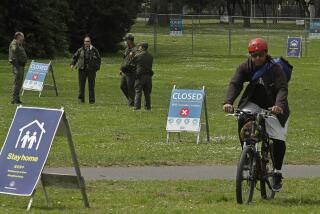San Diego considers cannabis lounges. San Francisco set the standard
San Diego is considering allowing cannabis businesses to open lounges where customers can smoke or eat the product on site. The city will take a look at what’s happening elsewhere, including in San Francisco, where such lounges already are part of the cultural landscape.
Not surprisingly, the City by the Bay has a big head start on other cities that are just beginning to permit on-site smoking rooms or moving in that direction.
Some members of the San Diego City Council’s economic development committee last week said they were open to a proposal by cannabis industry leaders to join the trend but wanted more information. Specifically, council members asked staff to find out what kind of regulations were in place in other cities.
Californians voted to legalize recreational marijuana in 2016, but smoking it in public is still forbidden. The industry and those who partake often say getting high is, among other things, a social affair and are clamoring for public establishments where people can safely smoke together.
Criticism of cannabis lounges often echoes arguments against legalization in general: claims that it’s a harmful drug, can involve criminal activity and impairs driving.
“Consumption lounges,” as they are sometimes called, are allowed in Oakland, Palm Springs, West Hollywood and Eureka. Others cities are considering it. But cannabis lounges are pretty much institutionalized in San Francisco, where about 10 have opened and are reviewed like restaurants for their service, menus, design and atmosphere.
Many have thematic decor to distinguish themselves while also enticing customers with amenities such as coffee, sports on TV and specialty nights. They rent out bongs and other marijuana paraphernalia for use during visits.
The Barbary Coast Dispensary lounge, probably the best known, has plush, red leather booths, flocked wallpaper and dark wood paneling that harken back to high-end speakeasies from the city’s storied past.
“At Urban Pharm on 10th Street, there’s a ‘steam punk’ vibe and they are ‘yucking’ it up — with comedy night’s every week in their ‘Giddy-Up Lounge,’ ” according to the Bay Area’s ABC7.
The interior at the recently opened Moe Greens mimics an upscale Las Vegas casino of the 1950s and ’60s, with “Sputnik” light fixtures and green leather booths, according to the San Francisco Chronicle. (Moe Greene is a fictional mobster involved with casinos in “The Godfather” book and movie.)
“Opening a cannabis dispensary now is all about creating an experience,” Nate Haas, the co-owner and CEO of Moe Greens, told the Chronicle.
Comedy shows aside, the atmosphere in these establishments tends to be more coffee shop or cigar lounge than roaring Vegas or Prohibition-era barroom, according to descriptions in both marijuana-focused and mainstream media. Alcohol cannot be served by the lounges nor brought in by patrons.
Most close by 10 p.m., and rowdy behavior is discouraged.
Magnolia Wellness adapted state alcohol intoxication protocols to get its Oakland lounge permit, according to the publication Leafy, which quoted an employee as saying the lounge had cut people off a few times and called for an Uber.
Magnolia also employs a registered nurse.
San Francisco has had medical marijuana smoking rooms since 2010, and the city has long had a lax attitude toward pot smoking in general. So the transition to recreational facilities wasn’t a huge leap.
The growth of cannabis lounges hasn’t been without disputes. The first lounge permit approved in Palm Springs — for the Coachella Valley Green Dragon — drew criticism from a business that had leased part of the same building for more than 20 years.
The owner of the Revive Wellness Center and Revive Salon & Spa told the Press-Enterprise he would move his business because he didn’t want to subject “clients and patients to that kind of indoor pollution.”
Secondhand smoke is a big concern in a state with some of the nation’s toughest anti-smoking laws.
In San Francisco, the lounges “must be directly exhausted to the outdoors by a filtration system that, at minimum, eliminates all odor and smoke,” according to the city’s operating standards. Also, among other rules, smoke must not drift into other portions of the premises, and the smoking rooms doors must be self-closing and have a gasket to provide a seal where the door meets the stop.
Also, the business “may not require employees to enter the Designated Smoking Room as a condition of their employment.” The room must be designed so the smoking can’t be seen by the public through windows. And the lounges must otherwise comply with the safety and health regulations for the affiliated dispensary.
Such safeguards for lounges aren’t likely to mollify opponents in San Diego.
“There has and continues to be significant creep in what should be public health and safety policies in San Diego related to a commercial pot industry,” said Scott Chipman, leader of an anti-marijuana group called San Diegans for Safe Neighborhoods.
“As awareness of the harms of marijuana use expands, ironically, advocacy by some politicians for expanding the drug dealing, access and use are also expanding.”
Stating the obvious, San Diego and San Francisco are very different places — culturally, politically and socially.
Nevertheless, San Diego far and away has been this region’s leader in allowing marijuana dispensaries and growing and testing facilities. That record suggests lounges may be in the city’s future. Although some cities in the county have exercised their right to ban marijuana facilities, others are slowly moving to allow them.
Encouraged by the cannabis industry, elected San Diego city officials have been aggressively looking for ways to increase access to legal marijuana since the 2016 election. They contend such policies both help curb the black market for cannabis and capture tax revenues from it, which they note could go to other cities.
There’s little to suggest they’ll turn back now.
michael.smolens@sduniontribune.com
More to Read
Start your day right
Sign up for Essential California for news, features and recommendations from the L.A. Times and beyond in your inbox six days a week.
You may occasionally receive promotional content from the Los Angeles Times.






